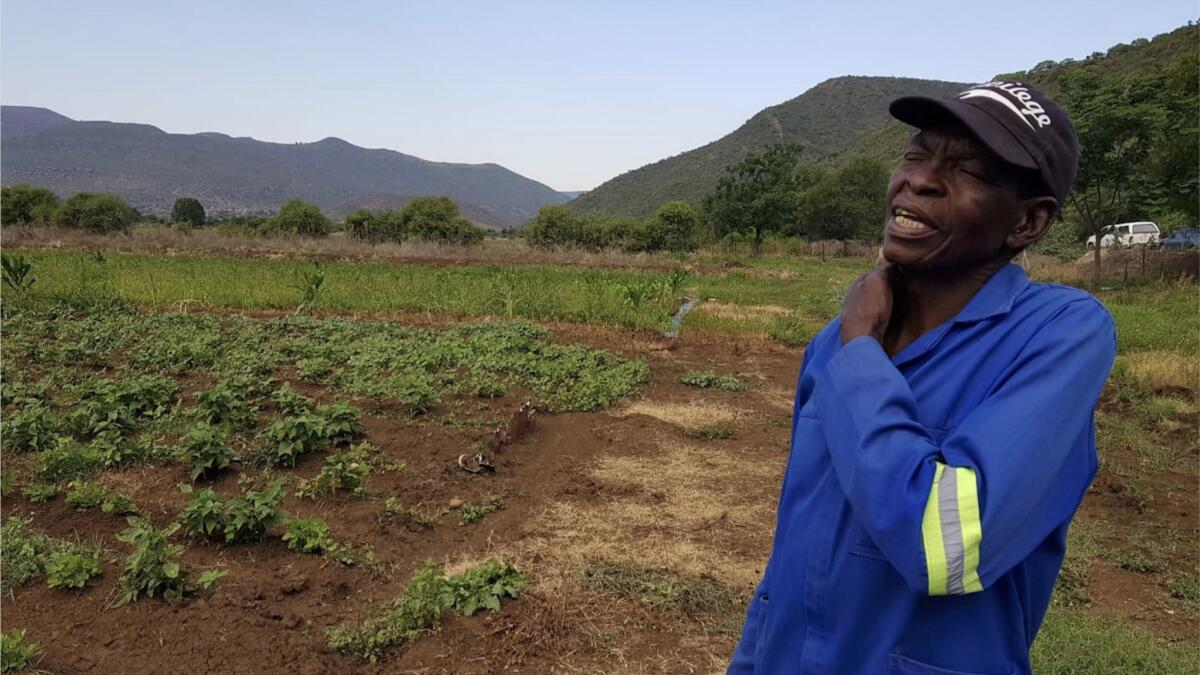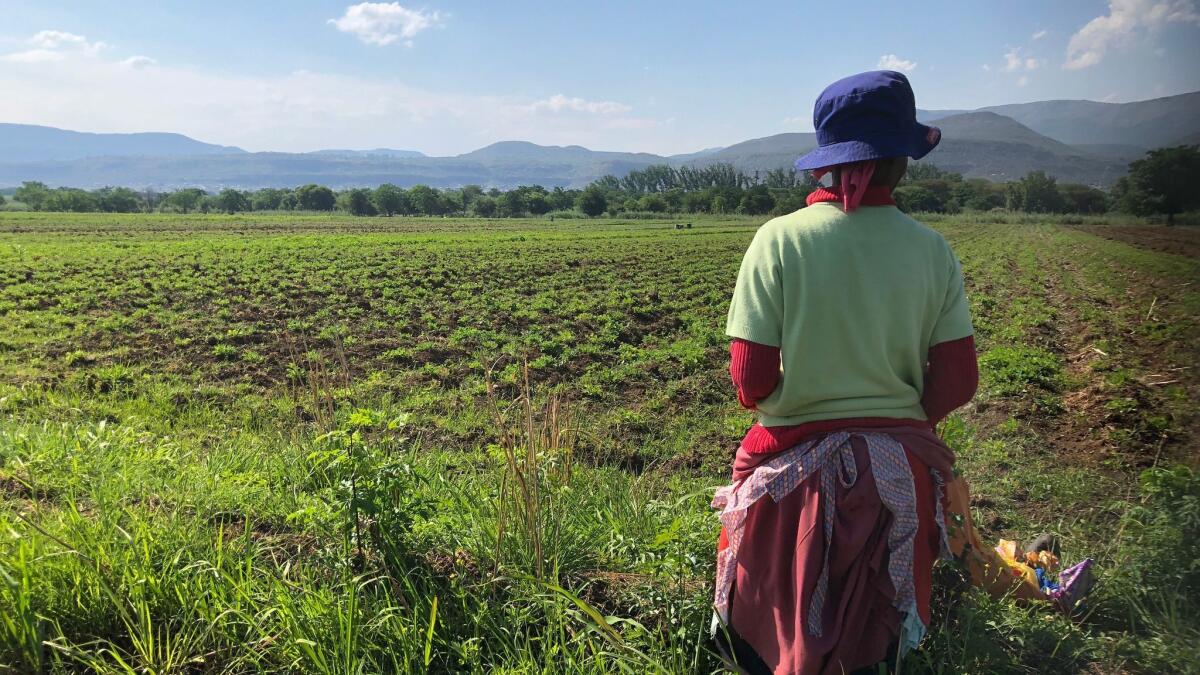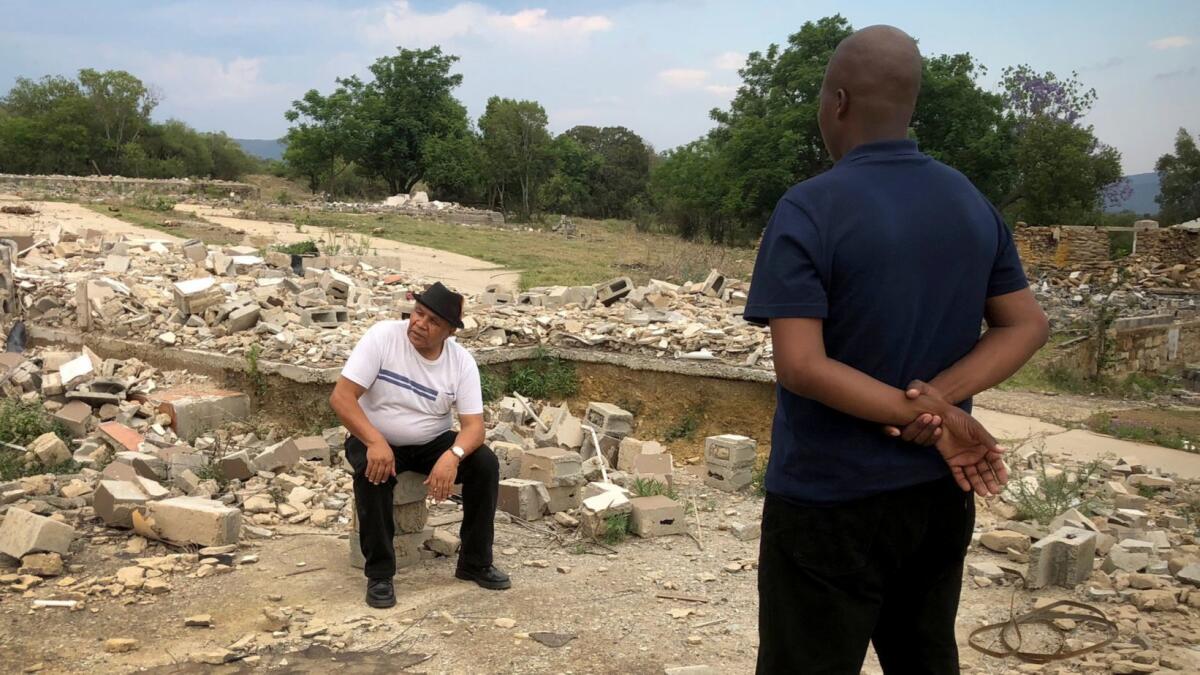Apartheid ended nearly 25 years ago, but racial disparities in landownership still haunt South Africa

- Share via
Reporting from Uthukela District, South Africa — Guests at the Tugela Private Game Reserve once rambled through the bush in open-air four-wheel-drives in search of leopards, elephants and other wildlife that roamed the 17,000-acre property.
Then in 2012, the South African government bought the reserve from its white owner for about $13 million and gave it to two black communities that had inhabited the land before being gradually expelled starting about a century ago.
Their return was part of a long-running effort to correct the wrongs of white rule and turn more black South Africans into landowners.
But with no experience running a tourism operation or caring for wild animals — and no training or financial help from the government — the new owners stumbled and the business collapsed.
The lodge needs repairs. The water supply is broken. Few tourists visit. Dozens of animals have been poached.
“One day I fell through” the floor in a guest room, said Nozibusiso Mabaso, 31, who helps look after the lodge. “It’s messed up.”
Huge racial disparities in property ownership are one of the most enduring legacies of colonialism and apartheid in South Africa, where millions of blacks were driven off their land and forced into vast slums or 10 ethnic states known as homelands.
Nearly a quarter of a century after the transition to democracy, blacks make up 80% of the population but own just 4% of individually held farmland and 30% of urban land. Whites are 8% of the population and own 72% of farmland and 49% of urban land.
The failure of the government to reduce those gaps has fueled black support for a highly controversial plan that would allow the government to seize land from its white owners instead of being required to purchase it.
But experts and activists — both black and white — say that with or without compensation, land transfers will continue to fail if the government doesn’t do more to prevent corruption in how the land is redistributed and provide more support for the new owners.
At the Tugela reserve, 230 miles south of Johannesburg in the district of Uthukela, the old landowners stayed on for a time to run the operation.
But they ended that arrangement because the new owners wanted more of the profit and more training. The government helped bring in a different operator that included a black partner, but that deal also fell apart because the new owners refused to sign on to a long-term plan.
The two groups that received the reserve — the Ngome and the Gugwini — had long inhabited the land before a white farmer took it over and forced them to become tenant workers or leave. Over the years, some had their houses burned and their livestock confiscated.
Now they can’t agree on how to run the business.
“In the long run, we should be able to run the game reserve on our own,” said Mbuso Mchunu, chairman of the Ngome Trust, which represents the community. “That’s our mission. That’s our vision.”
In the meantime, he said, the new owners are looking for a partner — black or white — who is experienced and fair-minded.
Anthony Arde, a white commercial farmer, has been negotiating with both groups to reopen the reserve with the help of foreign investors, but those talks have stalled.
“The government needs to get involved down here,” he said. “They could resolve the conflicts easily. The only people losing out now are the communities themselves.”
Not far from the game reserve, outside the agricultural town of Weenen, which means “weeping” in Dutch and was the site of some of the country’s bloodiest disputes over land during colonialism, a land dispute between two other communities turned violent, resulting in several deaths and the destruction of a small factory that used to package potatoes.
“Bringing back the land to the people is a good thing, but it’s being done incorrectly,” said Lutho Vilakazi, a leader of one of the groups, the Mabaso. “We live in fear. Anything can happen at any time.”
It’s hardly the vision that Nelson Mandela had when he was elected president of South Africa in 1994. The constitution he ushered in two years later mandated the government to improve citizens’ access to land, and his ruling party — the African National Congress — set a target to transfer 30% of land in white commercial farming areas to black South Africans by 1999.
Today, just 10% has been transferred.
A total of 8.2 million acres has been purchased by the government and transferred based on claims by people who lost it after 1913, when a law took effect restricting blacks from buying or selling land throughout most of the country.

As of 2016, more than 26,000 claims were pending, a backlog that would take 35 years to resolve at the current pace of adjudication.
An additional 12.1 million acres have been transferred through a program in which the government finds desirable land, then negotiates with the owners to buy it.
Land redistribution policies originally focused on helping the poor, but the goal eventually shifted to establishing a class of black commercial farmers — a change that opened the government to allegations that it had corrupted the program to benefit the elite.
The Special Investigating Unit, which handles major state corruption cases, is looking into allegations that the Department of Rural Development and Land Reform, which oversees land transfers, has allocated several farms illegally.
Phuti Mabelebele, a representative for the department, declined to comment on the investigation but in an email acknowledged that land transfers had run into trouble and said that the government was setting aside millions of dollars to help new farmers this planting season.
In a meeting with reporters in November, the country’s president, Cyril Ramaphosa, said land reform has been beset by “a lot of problems — levels of incapability, corruption, slowness.”
“We’ve upped the game a little,” he said, explaining a new approach: expropriation without compensation.
The plan was popularized by a small but influential opposition group called the Economic Freedom Fighters, which argues that returning white-owned land is the only way to deliver justice to black South Africans. The idea runs counter to the spirit of reconciliation that Mandela promoted until his death in 2013, but with glaring inequality and soaring rates of black unemployment, it has become a winner politically.
Ramaphosa’s ANC, which had been split on the issue, voted to pursue the policy last year in hopes of speeding up land reform — and holding on to power in national elections scheduled for 2019. This month the Parliament took a key step toward amending the constitution to legalize land seizures without payment, endorsing a recommendation from one of its committees to make the change.
Unsurprisingly, members of the white minority are worried that such a policy would embolden people to simply take private land on their own. It’s already happened in several urban areas this year, prompting clashes with police.
Critics also fear land seizure would scare away overseas investors or lead to food shortages like those in Zimbabwe after white farmers were forced out in the 2000s.
AfriForum, a rights group that advocates for the interests of white people, has threatened legal action if the government changes the law.
The controversy even attracted the attention of President Trump. In August, after Fox News aired a segment about South Africa’s land policy, he tweeted that his administration would look into the government’s seizure of farms and the “large-scale killing” of farmers. Neither of those things have happened.
The uproar over expropriation has obscured the issue of what happens after land changes hands.
Ndoshi Masoka, whose community was given farmland in the Uthukela district, said he and other black farmers need training on how to increase productivity and access credit to buy tractors and fertilizer. Government programs that provide training and loans are limited in reach and widely considered ineffective.
“People are not working. They’re hungry,” Masoka said. “The government isn’t learning from what’s happened to us.”
It is a common complaint in an area that has seen a relatively brisk pace of land transfers compared with elsewhere in the country. People say the government hasn’t shown much interest in trying to help new farmers improve their productivity.
Roland Henderson, a white farmer in the town of Besters who has been pushing a plan to rehabilitate struggling land reform projects in the Weenen area, said the government has shown little interest in making things right.
“There is no appetite at all to revisit these projects on a meaningful scale,” he said. “Everyone agrees with us, and then nothing happens.”

Raymond Trollip, the chairman of the district land reform committee, which works with the government on the issue, said authorities should have done more research to avoid land transfers that stir animosities between rival groups.
Many of the projects were “set to fail,” said Trollip, who is a member of the Khoisan, one of the ethnic groups that was classified as “colored” under apartheid and had marginally more rights than blacks.
When land transfers do succeed, it is often because the new owners already have experience working on the land they are given.
That was the case in one of the earliest land transfers in the Weenen area. In 1998, the government purchased part of a large white-owned farm and gave it to a group of the farm’s workers.
During apartheid, the farm’s workers earned as little as 30 cents a month and were prohibited from sprucing up their homes or keeping more than a few cattle and goats. In the land transfer, about 25 workers and their extended families got roughly 3,000 acres.
Today they own their homes and land and earn tens of thousands of dollars growing maize and peanuts and raising livestock.
Their children are in school. They don’t get pushed around by a white boss, or told what they can or can’t do with their lives.
“I can park a car in front of my house,” said Feli Ngubane, 51, who worked on the farm during apartheid. “I used to have to hide it because we weren’t allowed to have cars.”
“If you just look at the homes, they’re much better now,” said another former employee, Mbhinelwa Khumalo, now in his late 60s. “We’re comfortable. We live on our own land. We don’t have somebody telling us how many animals we can keep.”
Mahr is a special correspondent.
More to Read
Sign up for Essential California
The most important California stories and recommendations in your inbox every morning.
You may occasionally receive promotional content from the Los Angeles Times.













